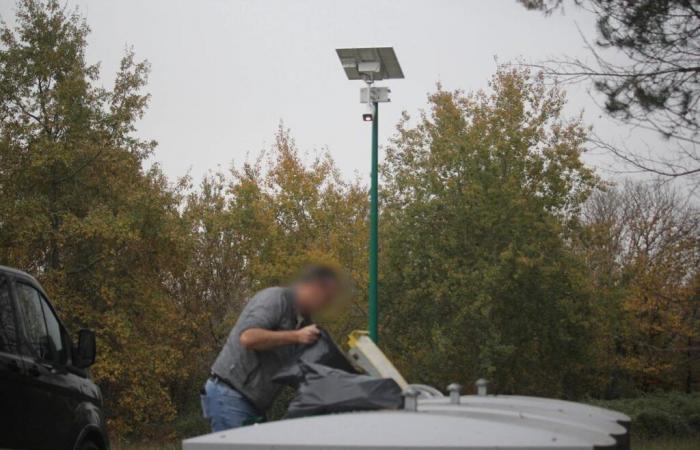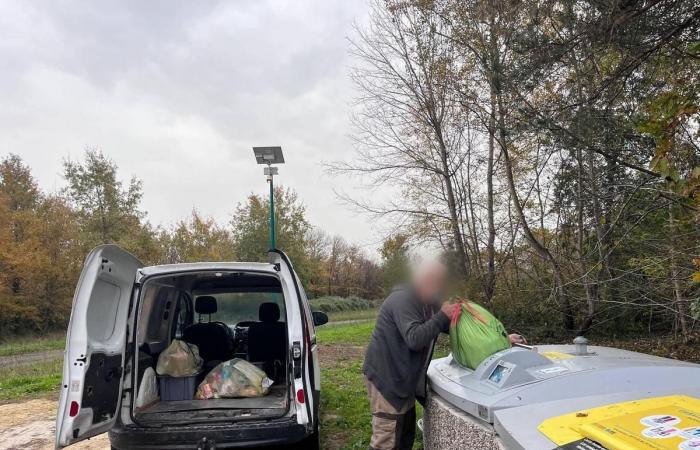OYou really can't miss it: it's a large green mast. It sits at a place called Toutifaut, in Creysse. It could be mistaken for a lighting pole, but a white light attracts attention. If you look closely, it's a camera that is installed at its top. It is focused on the containers of the Dordogne Departmental Joint Waste Union (SMD3).
Here is the camera, clearly visible with its indicator light, installed in Creysse.
Jonathan Guerin
The initiative is getting a lot of attention. It is the work of the mayor, Frédéric Delmarès: “It is not yet in service but will be soon,” he announces. From the start, we had a lot of incivility in this sector. The aim is to dissuade people from leaving their bins here. We plan to take control of cleanliness in the community. »
For the moment, two cameras are planned. “Afterwards, we don't stop ourselves from buying more, or even having mobile ones to run them. » The budget would be “a few hundred euros” but, notes the chief magistrate, “cleanliness and citizenship are priceless”.
The mayor defends himself
This has relaunched the great debate on the new waste collection system in Périgord. Since 2022, the SMD3 has gradually eliminated door-to-door collection in favor of voluntary drop-off points. Frédéric Delmarès does not, however, say anything bad about it: “50 to 60% of households in the town will pay less in 2025 than this year,” he calculates. The previous system was not completely ideal. »
The day “Sud Ouest” came to Creysse, the residents were all in favor of the councilor: “When you follow the rules, being filmed does not pose a problem,” says David. “This system is very good,” maintains Franck. It used to be dirty and now it's more often clean. I don't know if this will solve everything, but it will certainly dissuade those who used to throw away their trash in bulk without even getting out of the car! »
Jonathan Guerin
For the mayor of Creysse, Frédéric Delmarès, who plans to install two cameras, “cleanliness and citizenship are priceless”.
“We are going to buy a first mobile camera, which we will carry around. It’s around 10,000 to 15,000 euros”
Other localities are in the starting blocks, as revealed by “Dordogne libre”. Chancelade, for example, will also move to video surveillance of terminals in 2025. “This will go hand in hand with the creation of our municipal police which will also be responsible for these issues,” explains Mayor Pascal Serre. We are going to buy a first mobile camera, which we will take around. It's around 10,000 to 15,000 euros. »
The project has a strong political dimension. According to the elected official from Chancellery, it was SMD3 who contacted him to install this equipment. “I was promised implementation in the fall, but nothing to move; so if in the spring there is nothing, the municipality will do it. »
In this suburb of Périgueux, a resident opposed this type of surveillance, but Pascal Serre defends himself: “I have discovered, since my election in 2020, how sensitive users are to these problems. »
Opponents mobilized
His case caused the slayers of SMD3 to panic. On the Facebook group of the Collective of users unhappy with waste collection in the Dordogne (which no longer speaks to the press), we can read comments that are not very nuanced: “a totalitarian regime”, “it is time to stop the costs” , “They really would have to have some nerve to spend more public money on a system that doesn't work and that they are incapable of managing! », “The waste will end up in the forest”…
We contacted Isabelle Moreau, deputy general director of SMD3, to respond to these criticisms. She first comes back to the principle: “We have received a lot of requests from mayors and residents to find a solution for the waste found at the foot of the terminals. This is how the idea of cameras came about. It is still only in the project stage and we have not yet launched the system. We intend to deploy mobile cameras in voluntary communities. »
“We will try to ensure that the budget does not grow exponentially”
The system will not use artificial intelligence. The images will only be viewed by sworn agents. There will therefore be no facial recognition, for example. Only license plate reading will be used. “With data protection,” assures the union.
A new perverse effect?
Nevertheless, a fundamental question arises: considering that a certain part of the population is totally resistant to voluntary delivery points, is this not a new perverse effect which manifests itself in an unforeseen way, and which will generate additional costs for the community? “Installing cameras means fighting against incivility,” defends Isabelle Moreau. We will try to ensure that the budget does not grow exponentially. »
The deployment of the cameras is planned for 2025.







